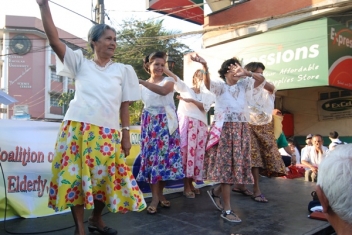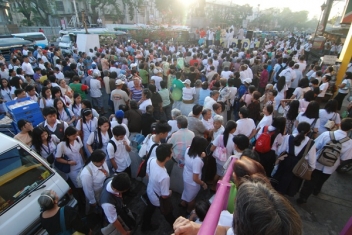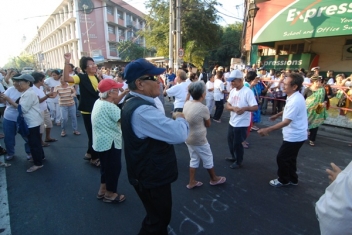 On 16 February, President Gloria Macapagal Arroyo of the Philippines signed the Expanded Senior Citizens Act of 2010.
On 16 February, President Gloria Macapagal Arroyo of the Philippines signed the Expanded Senior Citizens Act of 2010.
The Act includes the introduction of a new non-contributory pension which will be targeted at the “poorest of the poor” over the age of 60.
It will also bring into place a range of tax breaks for senior citizens that are expected to affect 4.2 million older people, as well as health insurance provision and a death benefit.
Pension is “a people’s victory”
The pension will be 500 pesos per month (approximately $11US) for “indigent senior citizens”. These are defined by the Act “any senior citizen who is frail, sickly or with disability and without permanent source of income, compensation, pension or financial assistance from relatives to support his basic needs”.
The passing of the bill is being seen as “a people’s victory” by many. For three years, the Coalition of Services of the Elderly (COSE) – a member of the HelpAge global network – and the Confederation of Older Persons Association of the Philippines (COPAP) have been campaigning for the introduction of social pensions. This campaigning has involved intense lobbying of key senators and congressmen, such as Senator Pia Cayetano, principal author of the expanded Senior Citizens Act.
Campaign driven by older people
But it has also taken the form of more public action. In 2008, as part of the HelpAge global network campaign “Age Demands Action” – held annually on the UN International Day of Older People – 1,600 older people marched to congress holding placards demanding a pension for poor older people.
At congress, they were invited to the session halls to sit in on a discussion about the pension. While COSE and COPAP supported this process, the planning of the day and the march itself was primarily driven by older people.
Since 2008, the lobbying has continued, and this has been crucial in recent weeks and months as the pension has been debated. Indeed, until the signing of the act on Tuesday, there was much doubt as to whether it would come into law. In January, the bill was passed by the Senate, but the provision of the social pension was initially cut by Congress.
Eventually, the bill was passed by both houses with the inclusion of the pension – only the suggested amount was reduced from 1,500 pesos per month to 500. Meanwhile, up to last week, the Department of Finance was urging the President to veto the bill, principally on the basis of potential complications created by the tax breaks.
Older people took to the streets
 In light of these delays, calls grew to finally ratify the bill. Salvacion Basiano, a 65-year-old retired public school teacher and member of COPAP criticised politicians for empty words in light of the upcoming election.
In light of these delays, calls grew to finally ratify the bill. Salvacion Basiano, a 65-year-old retired public school teacher and member of COPAP criticised politicians for empty words in light of the upcoming election.
He said: “Many of us are poor. We see in many politicians’ electoral campaigns the use of the poor in their television advertisements and campaign promises, and in the delay of the signing of the Expanded Senior Citizens Act.”
On 15 February, older people took to the streets again to demand that the bill be signed.
Pension will reach 1.2 million older people
The act, when implemented, will make a significant difference to many older people. The pension is expected to cover 1.2 million older people, estimated to be slightly less than 20% of the older population. People like Alejandro, 71, who has been selling cigarettes and candy on the street for two years. He wants to stop working but cannot afford to do so.
Despite the progress, there is still work to be done to fully address the issue of old age poverty in the Philippines. By targeting just a fifth of the older population, there will still be many older people who will miss out.
Research by HelpAge has shown the challenges of targeting the poorest, as they often face the biggest barriers in accessing such programmes. The level of the grant – at around 7% of an average income – is at the low end of the scale compared to international experience. The level of 1,500 pesos – originally suggested – is more in line with the levels found in the many successful social pensions, such as South Africa, Namibia, and Bolivia.
Key step forward
 Nevertheless, the introduction of a non-contributory pension in the Philippines marks a key step forward in the country and – significantly – one where the voice of older people has been at its heart.
Nevertheless, the introduction of a non-contributory pension in the Philippines marks a key step forward in the country and – significantly – one where the voice of older people has been at its heart.
The approval of the social pension and the Expanded Senior Citizens Act of 2010 demonstrates the validity of COSE’s approach, which is closely related to the grassroots movement.
HelpAge, through its regional office, has been supporting COSE since 1989 in a range of ways including training, research and advocacy. COSE’s participation in various events at regional level has also raised awareness on the issue of income security in old age.
“Proof that older people are a powerful force in society”
Fransiskus Kupang, Executive Director of COSE, said:
“The signing of the new law is proof that older people are a powerful force in society. Older people identified their issues and brought them to the right people. They were tireless and full of optimism; no amount of power could stop them fighting for their agenda and pushing the policy makers to understand and support them.
“This victory was the victory of older people. As the Director of COSE, this is the most meaningful compensation for our work. No amount of money could replace this.”
